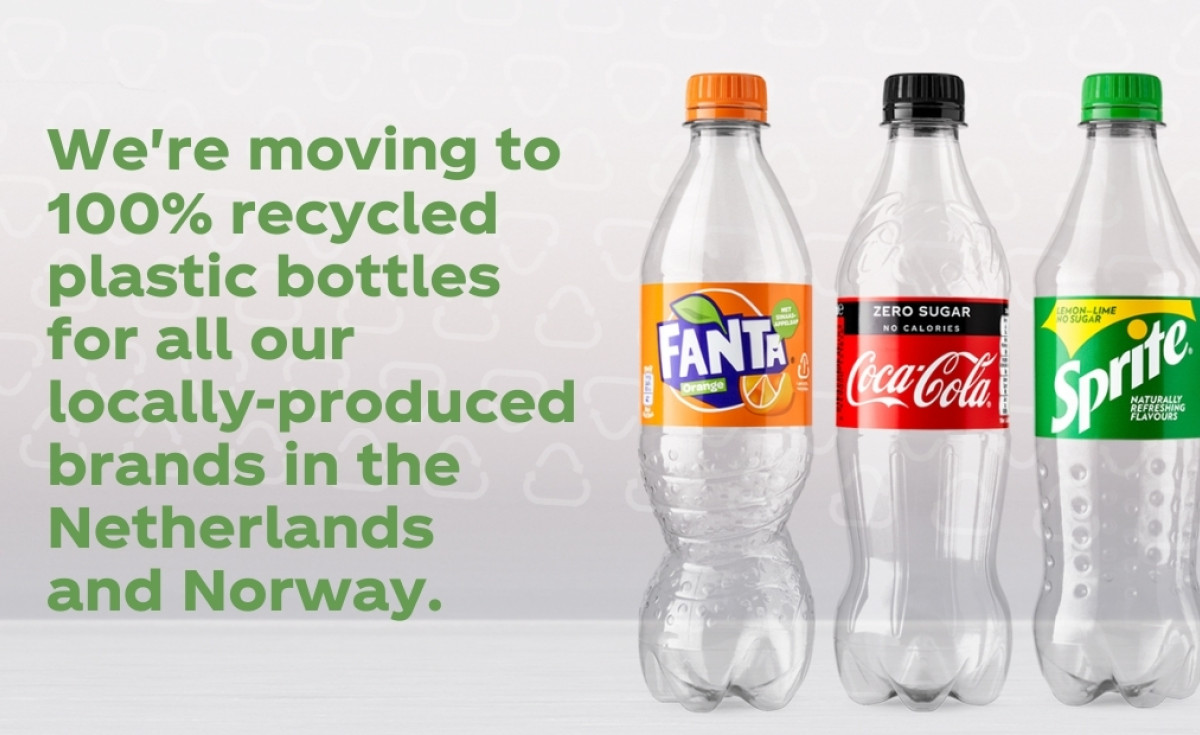News
Coca-Cola in Western Europe transitions to 100% recycled plastic (rPET) bottles in two more markets

07/09/2020
Investors, Action on Packaging, Innovation, Suppliers, Customers, Sustainability |
News

07/09/2020
Investors, Action on Packaging, Innovation, Suppliers, Customers, Sustainability |
Transition to 100% rPET confirmed for Coca-Cola in the Netherlands and Coca-Cola in Norway, marking important transition from use of new virgin oil-based plastic in PET bottles towards a local closed-loop recycling system supported by the Dutch and Norwegian Deposit Return Schemes.
Coca-Cola in Western Europe today takes another important step on its journey to eliminating new virgin oil-based plastic as Coca-Cola in the Netherlands and Coca-Cola in Norway announce their transition to plastic bottles made from 100% recycled plastic (rPET).
Following the announcement (December 2019) that Coca-Cola in Sweden would become the first market to switch to 100% rPET, Coca-Cola in the Netherlands has announced that from October 2020 it will transition all its locally produced small plastic bottles to 100% rPET, including iconic brands such as Coca-Cola, Sprite and Fanta. Large plastic bottles will follow in 2021, making it the second market to transition its locally produced portfolio to 100% rPET.
The switch to 100% rPET in the Netherlands** will eliminate the use of more than 10,000 tonnes of new virgin oil-based plastic, amounting to a 21% reduction in the carbon footprint of its plastic bottles per year compared to the rPET level before the transition, when the portfolio in the Netherlands already consisted of more than 50% recycled PET.
Additionally, during the first half of 2021, Coca-Cola in Norway will transition to 100% rPET** for all plastic bottles that it produces locally. This transition will remove around 4,300 tonnes of new virgin oil-based plastic a year, and will deliver a 28% reduction in the carbon footprint of its plastic bottles per year compared with the rPET level before the switch when the portfolio in Norway was approximately 25% rPET.
Both Coca-Cola in the Netherlands and Coca-Cola in Norway will be the first companies in their respective countries to move their entire portfolio of locally produced plastic bottles to 100% rPET. This move supports Coca-Cola’s ambition in Western Europe to accelerate towards the use of 100% rPET and the elimination of new virgin oil-based PET in all of its bottles within the next decade. This will contribute to removing a total of over 200,000*** tonnes of new virgin, oil-based PET from its packaging portfolio a year as Coca-Cola in Western Europe transitions to local circular economies for PET packaging.
Towards local circular packaging economies
A key enabler for Coca-Cola’s switch to 100% recycled plastic material in the Netherlands and Norway is the rapidly expanding and effective Deposit Return Schemes operational in both countries. Coca-Cola in Western Europe recognises the vital role that well-designed Deposit Return Schemes will play in its 100% rPET vision. Well-designed Deposit Return Schemes can play an important role in delivering a circular economy for PET bottles at a local level, boosting PET bottles collection rates and increasing the quality of PET material collected with less contamination from other materials, making it much easier to recycle bottle to bottle.
Supported by innovation in recycling technologies, Deposit Return Schemes have enabled the production of high quality rPET resin in both Dutch and Norwegian markets, thus accelerating the transition to local circular economies for PET in these countries. In keeping with its commitment to build local circular economies for beverage packaging, Coca-Cola’s 100% rPET bottles produced in each market will be fully recyclable, so they can be used again as raw material for new bottles.
Joe Franses, Vice President Sustainability at Coca-Cola European Partners said, “Today’s announcement that Coca-Cola European Partners Netherlands and Coca-Cola European Partners Norway are making the switch to 100% rPET marks a vitally important step forwards on our journey to eliminating new virgin oil-based plastic across all our plastic bottles within a decade. Crucially, this announcement provides a compelling case for the role that Deposit Return Schemes can play in the creation of local circular economies for beverage packaging. Markets with well-designed DRS such as those in Sweden, the Netherlands and Norway not only have high collection rates but also have the capacity to collect a higher grade of material with less contamination.
Coca-Cola in Western Europe is a firm supporter of the implementation of well-designed Deposit Return Schemes across Europe, recognising the role they can play as part of local, closed-loop recycling system. We also remain committed to supporting innovative packaging and recycling technologies to help us to reach our target of 50% recycled content across all our plastic bottles by 2023.”
Action on Packaging
As part of their joint Sustainability Action Plan, This is Forward, Coca-Cola European Partners and The Coca-Cola Company in Western Europe have pledged that by 2025, Coca-Cola will: collect a can or bottle for every one it sells and ensure that all its packaging is 100% recyclable and by 2023 will ensure that at least 50% of the content of its PET bottles will come from recycled content, accelerating towards its ambition to use zero virgin oil-based PET in its PET bottles within a decade,. Today’s announcement that Coca-Cola will transition to 100% rPET in the Netherlands and Norway follows a number of CCEP innovation and investment announcements including its innovative CanCollar® packaging solution and investment into innovative recycling start-up, CuRe Technology.
*These brands are not part of The Coca-Cola Company.
** The switch does not apply to the following packaging: In Netherlands Coca-Cola/ Fanta orange 250ml, Aquarius/ Minute Maid 330ml, Sprite 375ml – which are produced in France and Belgium. This represents less than 3% of the total sales in the Netherlands. In Norway, the switch will not apply to Fuze Tea and Powerade brands. This represents 1.4% of the total sales in Norway.
*** By 2019, CCEP was already using 60,000 tonnes of rPET in its bottles and has committed to using 50% rPET by 2023